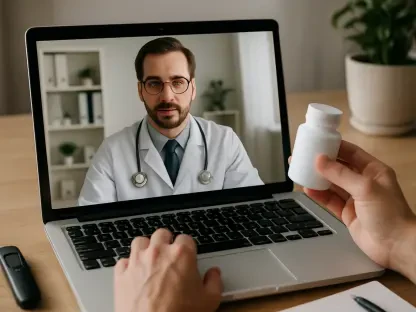Imagine walking into a doctor’s office to discuss a deeply personal health concern, only to feel judged before even speaking a word about your weight. This unsettling reality affects a significant portion of Americans, with many encountering bias that hinders open communication with healthcare providers. A recent survey conducted in early 2025 by Hers, in collaboration with Culture Co-op, involving 7,100 U.S. adults aged 18-65, sheds light on this pervasive issue. The data reveals not only the extent of weight bias in traditional medical settings but also a growing shift toward telehealth as a refuge for those seeking stigma-free care. As weight management remains a priority for over half the population, the intersection of societal perceptions, personal struggles, and evolving healthcare solutions comes into sharp focus. This exploration delves into how bias shapes patient experiences, the enduring trust in physicians, and the rise of digital alternatives that promise a more compassionate approach to health discussions.
Unpacking Weight Bias in Traditional Healthcare
The challenge of weight bias in healthcare settings is more common than many might assume, impacting 12% of Americans seeking medical advice. This bias often surfaces as subtle judgment during office visits, with 1 in 10 individuals reporting feeling criticized by their doctors. Certain groups face even higher rates of such experiences, including moms at 13%, people of color at 14%, and members of the LGBTQ+ community at 17%. These encounters create a significant barrier, discouraging patients from addressing weight-related concerns openly. Despite these hurdles, trust in physicians remains strong, with 42% of respondents naming doctors as their primary source of health guidance, far surpassing alternatives like online searches at 7% or AI tools at 2%. This dichotomy highlights a complex relationship where the need for professional advice persists, even as emotional barriers stemming from perceived judgment loom large in the patient-provider dynamic.
Beyond the statistics, weight bias profoundly affects how individuals approach conversations about their health. For 21% of those hesitant to discuss weight loss, fear of judgment is the primary deterrent, while 14% cite feelings of shame, and 8% point to broader social stigma. These emotional responses underscore a critical gap in traditional healthcare environments, where the absence of a safe, nonjudgmental space can derail meaningful dialogue. Interestingly, doctors still rank as the top confidants for weight loss decisions for 32% of Americans, ahead of partners or close friends. This enduring reliance suggests that while bias poses a real challenge, the expertise and authority of medical professionals continue to hold significant weight. The need for healthcare settings to evolve into more supportive spaces is evident, as fostering trust could bridge the divide between patients’ needs and the care they receive.
The Role of Body Image and Societal Influences
Body image, shaped by both personal and external factors, plays a pivotal role in how Americans perceive their health and weight. A striking 27% of survey respondents identified their own reflection in the mirror as the most influential factor on their self-perception, pointing to the deeply internal nature of this struggle. Yet, external forces are equally impactful, with doctors and social media platforms like TikTok tying as leading influences, outranking celebrities or fitness professionals. This blend of personal introspection and societal input creates a complex landscape where individuals navigate their weight loss goals. The survey findings emphasize that while medical advice carries authority, the pervasive reach of digital culture also shapes attitudes, often amplifying pressures or offering unrealistic standards that can further complicate health journeys.
Societal stigma and personal shame often compound the challenges of addressing weight concerns, particularly in medical contexts. The reluctance to broach the topic of weight loss is palpable, with many Americans feeling deterred by the potential for judgment or misunderstanding. This hesitation is not merely a personal barrier but a reflection of broader cultural narratives that equate weight with worth. As a result, the demand for environments where patients can speak freely without fear of criticism grows stronger. The intersection of self-image and external influence reveals a nuanced tension, where individuals seek validation and guidance from trusted sources like physicians, yet grapple with the weight of societal expectations. Addressing these dual pressures requires a shift in how healthcare providers and digital platforms alike approach conversations about body image and weight management.
Telehealth as a Stigma-Free Alternative
Amid the challenges of weight bias, telehealth has emerged as a promising solution for those seeking medical advice without the fear of judgment. Currently, 8% of Americans turn to telehealth for weight loss guidance, placing it among the top three sources alongside doctors and online searches. Over the past five years, 15% have embraced this digital option for various health needs, from mental health support to skincare and weight management. The appeal lies in the anonymity and comfort it offers, allowing patients to engage with providers from the privacy of their homes. This shift reflects a broader trend toward accessible healthcare that prioritizes patient ease over traditional in-person interactions, particularly for sensitive topics where stigma might otherwise deter open discussion.
The rise of telehealth also signals a cultural pivot toward embracing technology to address systemic gaps in healthcare delivery. For many, the ability to consult with a provider remotely reduces the emotional burden of face-to-face judgment, fostering a sense of safety in sharing personal health concerns. This platform’s growing popularity underscores a demand for flexibility and inclusivity in medical care, catering to diverse populations who may feel marginalized in conventional settings. As telehealth continues to gain traction, it offers a glimpse into a future where healthcare can be both personalized and less intimidating. The ongoing adoption of such digital tools suggests that patients are increasingly willing to explore alternatives that align with their need for dignity and respect in medical interactions.
Diverse Strategies for Weight Management
When it comes to tackling weight loss, Americans employ a wide array of strategies that blend traditional and modern approaches. Exercise stands out as the most popular method, adopted by 41% of those surveyed, while dietary adjustments like cutting carbs at 28% and reducing fat intake at 25% follow closely. Emerging trends also show significant uptake, with 21% practicing intermittent fasting, 18% using calorie-tracking apps, and 12% turning to weight loss medications. Niche methods, such as cleanses or adopting vegetarian and vegan diets, each attract 12% of respondents, illustrating the diversity of tactics in play. This variety reflects a personalized approach to health, where individuals tailor their efforts based on lifestyle, preferences, and access to resources.
The landscape of weight management strategies also reveals an openness to innovation alongside reliance on time-tested methods. The integration of technology, like apps for tracking intake, points to a growing comfort with digital tools in personal health journeys. Meanwhile, the use of medications highlights a willingness to explore medical interventions under professional guidance. This blend of approaches underscores the complexity of weight loss as a health goal, influenced by both individual determination and evolving options in the healthcare market. As patients navigate these choices, the role of trusted medical advice remains crucial, whether delivered in person or through digital platforms, ensuring that efforts are both safe and effective in meeting personal objectives.
Looking Ahead: Building Trust in Healthcare
Reflecting on the insights gained, it becomes clear that weight bias has been a persistent obstacle in traditional healthcare, often silencing those who need support the most. The trust placed in doctors, despite these challenges, has remained a cornerstone of health guidance for many Americans. Telehealth has proven to be a vital lifeline, offering a space where judgment is less likely to overshadow care. Moving forward, the focus should shift to creating inclusive medical environments, both in-person and online, that prioritize empathy over stigma. Healthcare providers might consider training to address unconscious biases, while telehealth platforms could expand services to reach underserved communities. By embracing these steps, the industry can ensure that every patient feels heard and valued, paving the way for more effective weight management and overall health outcomes in the years ahead.









